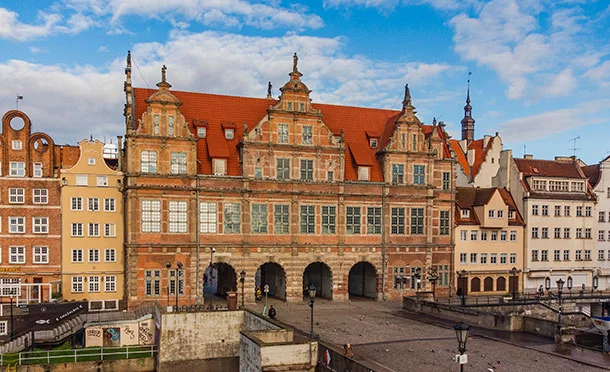Day 1
Topics of workshops accompanying the conference, conducted for 25 teachers and 25 directors of Pomeranian schools (3 hours each workshop):
1. SPARKS – free digital gamification tool for schools (run by Lascó, Italy)
2. NEF+ and international cooperation in the field of education (conducted by CIE, Poland)
NEF Gdańsk opening dinner with hosts and panellists (about 20 people)
Day 2
9.00 – 9.30 Registration
9.30 – 9.45 Welcoming
- Mieczysław STRUK – Marshal of the Pomorskie Voivodeship
- Dr hab. prof. UG Anna JURKOWSKA-ZEIDLER – Vice-Rector for Internationalization, University of Gdańsk
- Led by Joanna BOCHNIARZ, General Director, CIE
9.45 – 10.00 A word of introduction
- Michał PASIECZNY – Mayor of the City of Rumia
10.00 – 11.15 Panel I: Impact of digital transformation on the labour market, employers and local government.
A strong digital economy driven by Europeans with digital skills is crucial for innovation, growth, job creation and European competitiveness. At the same time, over 70% of European companies say that the lack of staff with the right digital skills is an obstacle to investment. The diffusion of digital technologies has a huge impact on the labour market and the type of skills needed in the economy and society. Member States, businesses, training providers, the European Commission and other organizations need to work together to close the digital skills gap. How are production and services changing under the influence of digital transformation? What does this mean for the Pomeranian labour market? What will be the expectations of employers from Pomerania towards new employees in the coming years and how do local governments and their schools react to these expectations? Presentation of the NEF+ project co-financed by the Erasmus+ program.
- Krzysztof JURCZYK – Poland Operations Manager, Intel
- Jakub KASZUBA – Vice President, Employers of Pomerania, President of the Management Board of Base Group
- Joanna BOCHNIARZ – General Director, Center for Innovative Education, REPRESENTATIVE OF POMERANIAN YOUTH:
- Zuzanna Jończyk – Student at the High School No. III with Bilingual Departments in Gdynia, Scholarship holder of the EFC Foundation
- Julia Perlejewska – Student at the High School No. III with Bilingual Departments in Gdynia, Scholarship holder of the EFC Foundation
- Moderation: Jorge GIMENO PAWLOWSKI, Atland Consulting Director
11.15 – 11.45 Networking break
11.45 – 13.00 Panel II: The role of schools, teachers and students in adapting to digital transformation.
Education and training must respond to the challenges and realities of the 21st century: meet the needs of students and help them cope with the feelings of stress and anxiety experienced in the face of the climate crisis, the pandemic and Russia’s invasion of Ukraine. 95% of respondents to the Open Public Consultation of Digital Education Action Plan believe that the COVID-19 pandemic is a turning point in the way technology is used in education and training (Digital Education Action Plan, Open Public Consultation, 2020). How can the school equip students with the competences needed to shape a more sustainable economy and society? How can it use attractive digital tools for this purpose? What are the barriers to digital and online education? Presentation of the digital tools of the SPARKS project co-financed by the Erasmus+ program.
- Dr hab. prof. UG Arnold KŁONCZYŃSKI, Vice-Rector for Student Affairs and Quality of Education, University of Gdańsk
- Adam KRAWIEC, Director of the Department of Education and Sport of the Marshal’s Office of the Pomeranian Voivodeship
- Miriam LANZETTA, Head of the EU Projects Unit, Lascò
- Dr Jule HILDMANN, PhD, Head of Research, Center for Innovative Education
- Dr Grzegorz D. STUNŻA, PhD, lecturer at the Institute of Pedagogy of the University of Gdańsk, president of the board of the Polish Society of Media Education
- REPRESENTATIVE OF POMERANIAN YOUTH: Michalina BONIECKA – Student at the High School No. III with Bilingual Departments in Gdańsk, Scholarship holder of the EFC Foundation, Oliwia KARNOWSKA – Student at the High School No. III with Bilingual Departments in Gdańsk, Scholarship holder of the EFC Foundation
Moderation: Joanna BOCHNIARZ, General Director, Center for Innovative Education
13.00 – 13.30 Networking break
13.30 – 14.45 Panel III: Metropolis towards offshore development: good practices supporting formal education.
How to provide practical support for teachers and tutors so that they can prepare their students for new professions? What are the main barriers to building the offshore labour market? Responsibility of local governments and schools for preparing local societies for the green transformation.
- Michał GLASER, President of the Management Board, Gdańsk-Gdynia-Sopot Metropolitan Area
- Agnieszka RODAK, CEO, Rumia Invest Sp. z o.o.
- Sylwia MROZOWSKA, Director of the Center for Sustainable Development, University of Gdańsk
- Jadwiga PIECHOWIAK, School Complex of Communications
- Joanna RYBICKA-GORNOWICZ, Local Content Ekspert, RWE
- REPRESENTATIVE OF POMERANIAN YOUTH: Mikołaj PATYK – Student at the High School No. III with Bilingual Departments in Gdynia, Scholarship holder of the EFC Foundation
Moderation: Jorge GIMENO PAWLOWSKI, Atland Consulting Director
14.45 – 15.00 NEF Gdańsk Closing
- Zbigniew CANOWIECKI, Employers of Pomerania
- Dr hab. Paweł POSZYTEK, General Director, Foundation for the Development of the Education System (FRSE), Erasmus+ National Agency and the European Solidarity Corps
- Joanna BOCHNIARZ, General Director, Center for Innovative Education – presentation of the Pomeranian Recommendations for the European Year of Skills


